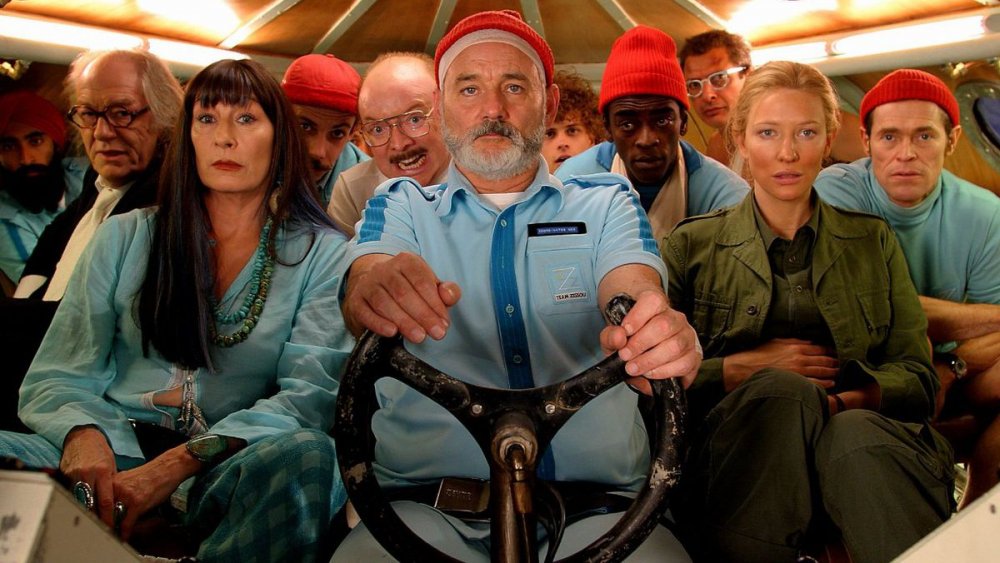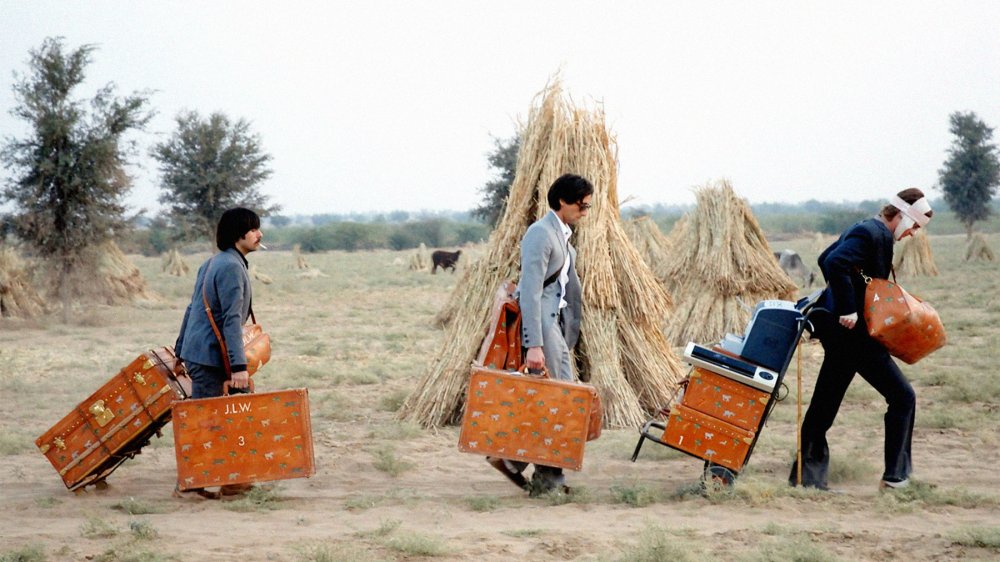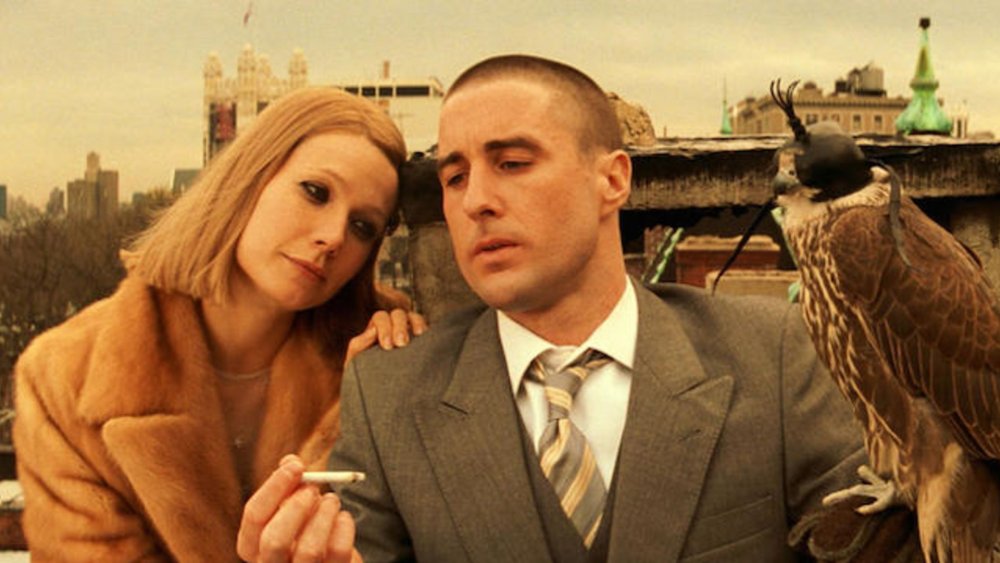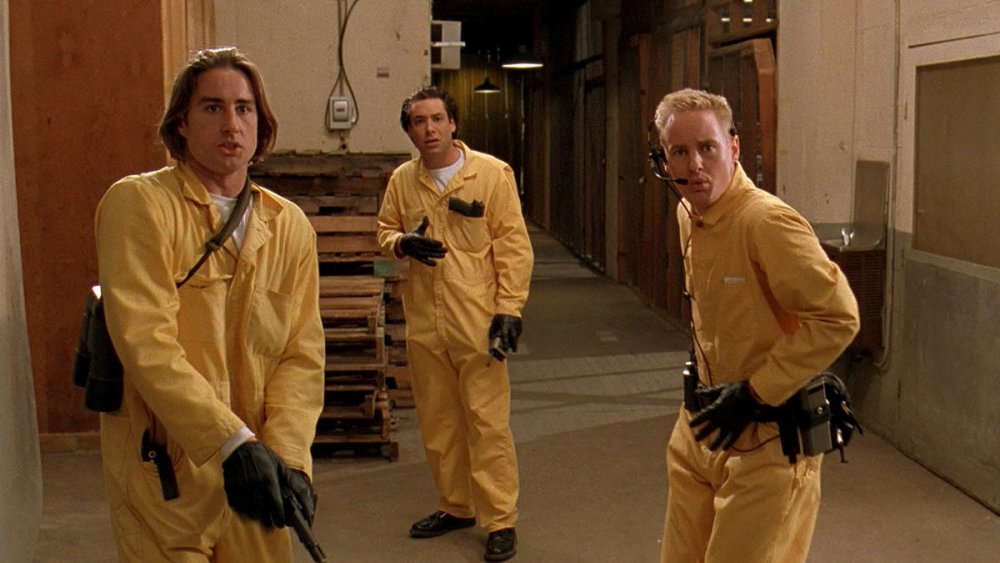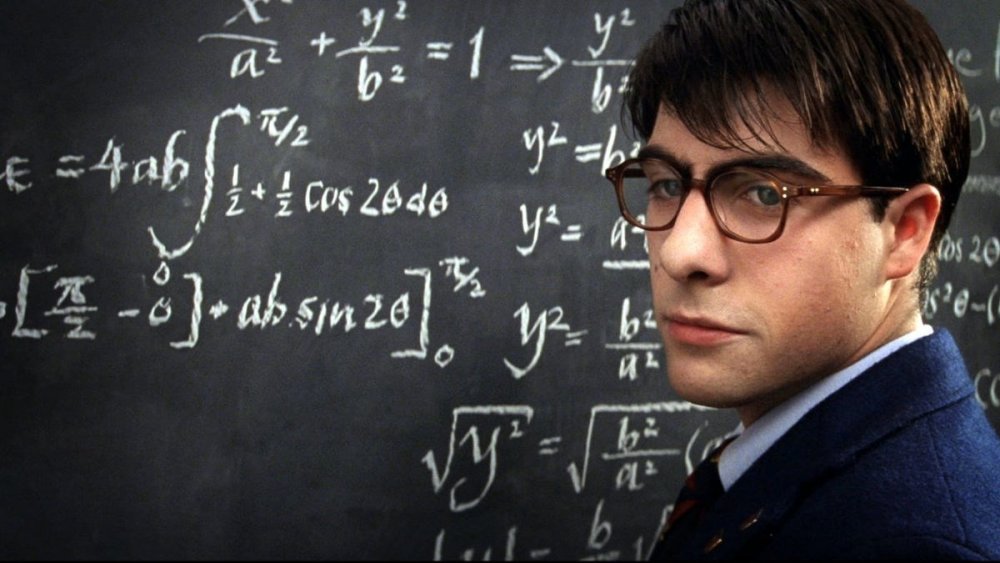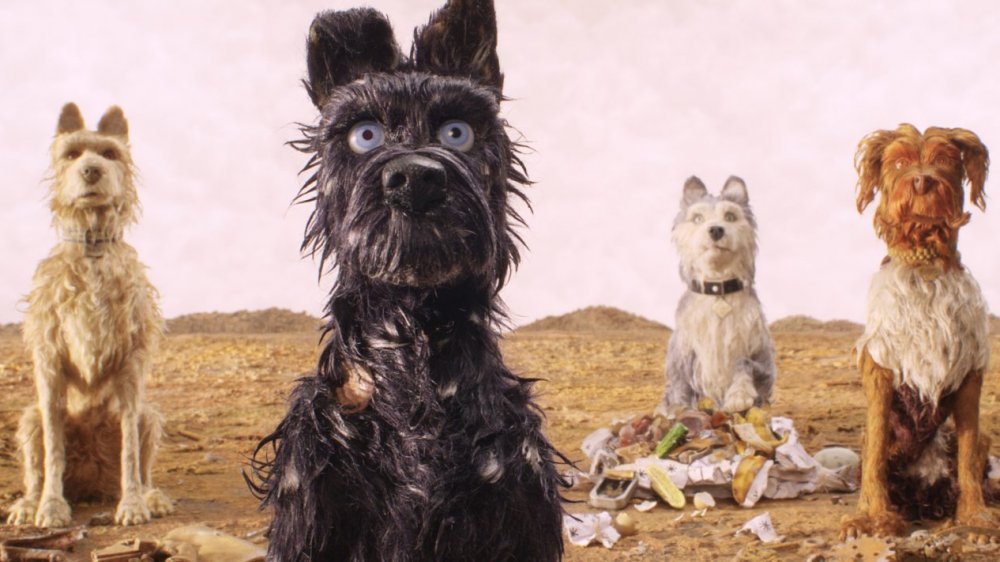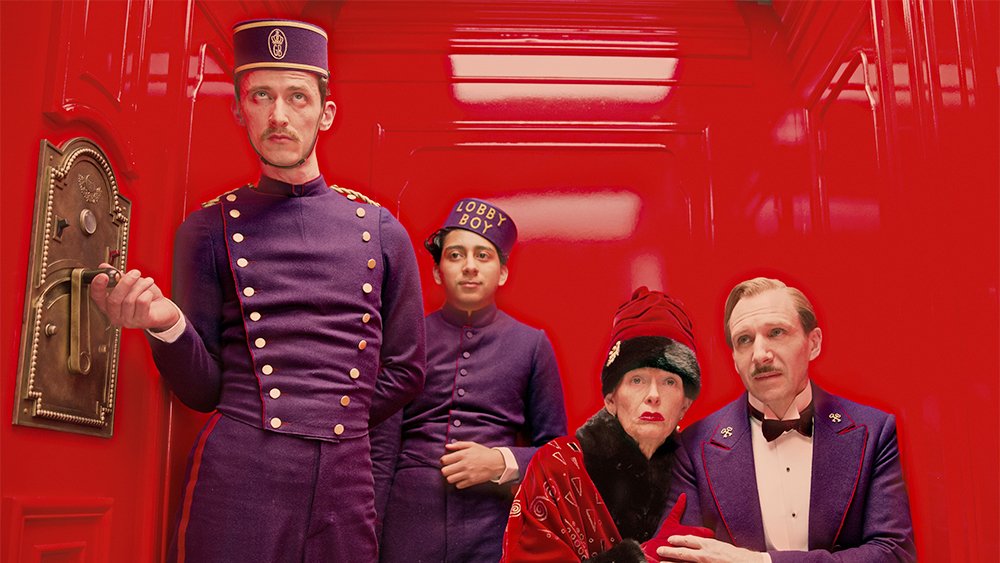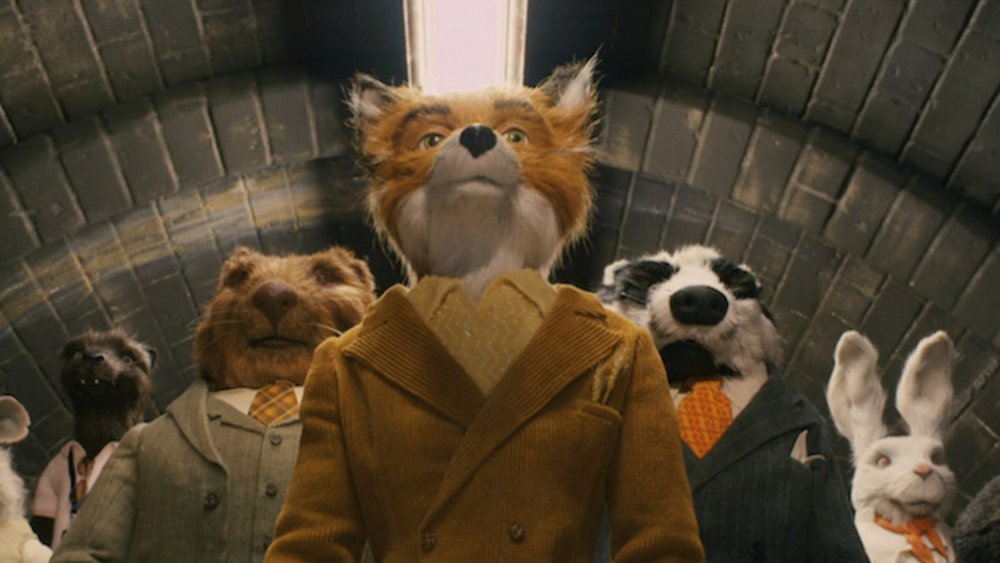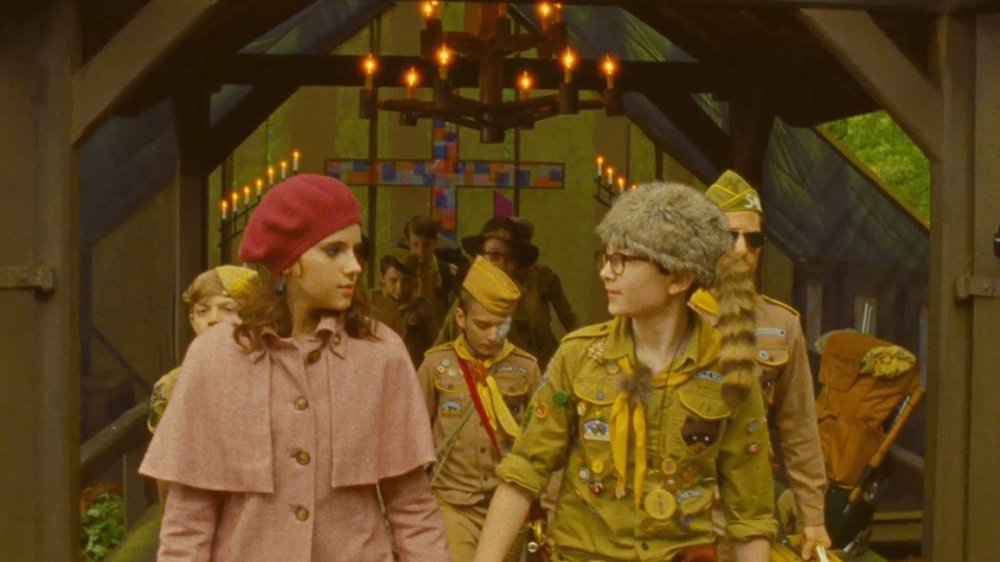Wes Anderson Movies Ranked By Rotten Tomatoes Score
Ever since announcing his presence to the world of cinema with his first feature-length film in 1996, director Wes Anderson has gone on to become one of the greatest directors of his generation ... and perhaps of all time. Thanks to his uniquely quirky film aesthetic, he's found widespread acclaim and something of a dedicated cult following, both among moviegoers and the actors who regularly show up in his films (e.g. Bill Murray, Anjelica Huston, Jason Schwartzman, the Wilson brothers).
But while most of his films have received praise ranging from substantial to universal, Wes Anderson has still been known to stumble occasionally both with the critics and at the box office. So if we were to look over at Rotten Tomatoes, which of Anderson's films would have the best ratings, and which ones would be considered stinkers? Well, play an obscure 1960s pop song and start walking in slow motion as we look at every Wes Anderson movie, ranked by their score on Rotten Tomatoes.
The Life Aquatic with Steve Zissou sank with a 56% on Rotten Tomatoes
Starring Bill Murray, Cate Blanchett, Owen Wilson, and Willem Dafoe, The Life Aquatic with Steve Zissou parodies the life of famed underwater explorer Jacques Cousteau as it follows the ill-fated adventures of the titular oceanographic adventurer, Steve Zissou. He, along with his plucky submarine crew and his freshly reunited illegitimate son, hit the high and low seas with the intention of finding — and destroying — the fabled jaguar shark.
The movie was nothing short of a box office and critical flop, bringing in just $34.8 million worldwide on a $50 million budget. And when it came to the critics, Life Aquatic floundered with Anderson's lowest Rotten Tomato score at 56%, barely making it past the halfway mark. While some praised it as a "lovely, slightly wistful tragedy," others were annoyed by the film's fanciful tone, claiming it suffered from "a near-terminal case of whimsy."
However, while the movie tanked in theaters, those who bought a ticket seemed to appreciate the film, as the movie currently holds an audience score of 82%. After all, the movie features some beautiful songs from Seu Jorge, an incredibly powerful moment when Zissou finally confronts the jaguar shark, and a scene where Bill Murray gets into a shoot-out with pirates while wearing a bathrobe. In recent years, the film has garnered a more forgiving reappraisal from some critics, and today, it holds something of a new classic status — yet another reminder that the critics don't always know best.
The Darjeeling Limited is chugging along with a 68% on Rotten Tomatoes
The Darjeeling Limited is a fairly simple story. It tells the tale of three brothers — played by Owen Wilson, Jason Schwartzman, and Adrien Brody — who take a train through India in an attempt to bond with each other and reconnect with their estranged mother. But as the train moves along and the story unfolds, their trip turns out to be a lot more complicated than anyone expected. During their journey, we learn that the brothers are coping with the loss of their father, literally carrying his baggage with them as they struggle with a venomous snake, life and death, and their own shortcomings. But while they're dealing with family squabbles and a cranky train conductor, they also find a bit of wisdom along the way.
This 2007 film enjoyed middling success, taking home $35.3 million on a $16 million budget and earning generally favorable reviews with a 68% score on Rotten Tomatoes. Granted, there were several critics who slammed the film, saying it was short on character development and that it was too "precious" for its own good. However, others agreed that it offered a "new maturity" compared to Anderson's previous films, making stunning use of the Indian landscape while diving into complex and dark themes. And while the film definitely retreads some of Anderson's favorite topics — dysfunctional families, distant parents, and a whole lot of ennui — that doesn't make the film any less powerful. Plus, the three leads give phenomenal performances that will make you cry from laughter and heartache.
With an 80% critics score, The Royal Tenenbaums was Wes Anderson's big break
Wes Anderson's big mainstream break came with the release of The Royal Tenenbaums, which tells the story of the titular Royal (played by Gene Hackman) as he attempts to win back his family's affection following decades of decidedly subpar parenting. Filled with flawed yet lovable characters, hilarious if somewhat offbeat humor, rich themes and razor-sharp dialogue, the movie tends to delight viewers even if it does pull the rug out and shock them from time to time.
Most of Wes Anderson's films lean into the concept of the "ensemble cast," but perhaps more than any other, The Royal Tenenbaums perfects this equation by taking industry-leading superstars at the top of their game, giving them richly fleshed-out, bizarre characters, then playing them off one another in a complex narrative. Here you'll see the likes of Gene Hackman, Anjelica Huston, Ben Stiller, Gwyneth Paltrow, Danny Glover, Bill Murray, and the brothers Wilson perform some of their finest work.
While The Royal Tenenbaums enjoys an admirable 80% on Rotten Tomatoes, as well as almost universal acclaim from audiences in general, it's somewhat astounding that way back in 2001, many of the industry's biggest critics gave it decidedly poor reviews. Regardless of this negativity, the movie was Wes Anderson's first major box office winner, gathering a substantial $71.4 million on a $21 million budget. This success propelled him to rank among the biggest directors of the era and established his future after the promising performances of his first two, decidedly smaller films.
Wes Anderson's first film, Bottle Rocket, nabbed an 85% approval rating
A romping crime comedy that gave the earliest hints of the odd style for which Wes Anderson would be renowned, Bottle Rocket was the director's first full-length film, and it also introduced the world to the brothers Wilson — Luke and Owen Wilson, that is. The movie was based on a short film of the same name that the trio filmed a few years earlier while attending the University of Texas at Austin, and while it's the only Anderson movie that doesn't include Bill Murray, it does feature a phenomenal performance from the legendary James Caan.
Bottle Rocket is nothing short of a delight for fans of Wes Anderson, as this gives us a chance to see the director unpolished and in the earliest stages of refining his style. Granted, out of all his films, this one looks the most like other movies that were coming out at the time, but you can still pinpoint uniquely Andersonesque elements like his witty dialogue, over-the-top absurdity, themes of loyalty, privilege, and difficult love, as well as the earliest hints of his visual aesthetic.
While Bottle Rocket performed poorly at the box office, earning just $560,000 on its $7 million budget, it garnered generally favorable reviews, securing a solid 85% on Rotten Tomatoes. And while positive reviews are always welcomed by a director, perhaps more gratifying for Anderson would've been Bottle Rockets' inclusion on famed auteur Martin Scorsese's list of his favorite films of the 1990s.
With Bill Murray and Jason Schwartzman, Rushmore impressed with 89% on Rotten Tomatoes
Written along with Owen Wilson, Rushmore was Wes Anderson's sophomore release. This 1998 movie follows the misadventures of a weird teenager named Max Fischer — played by Jason Schwartzman in his debut performance — who befriends disillusioned industrialist Herman Blume, who's played by the great Bill Murray. These two misfits begin vying for the attention of the same woman, and, well, a lot of strange hilarity ensues.
While Rushmore most certainly looks and feels like a Wes Anderson movie, it differs from the rest of his oeuvre in that its plot remains more or less laser-focused on its two main protagonists, rather than juggling a more expansive cast of oddball characters. This gives the audience a chance to not only see why Bill Murray stands out among his generation, but it also provides an unmuddied introduction to the talents of Jason Schwartzman.
Rushmore was a game changer for Wes Anderson. Not only did it perform reasonably well at the box office, earning $17.1 million on its $9 million budget, but it received rave reviews, culminating in an 89% on Rotten Tomatoes, and it's held up its reputation to this day. The film also introduced Anderson to repeat collaborators Jason Schwartzman and Bill Murray, the latter of which won an Independent Spirit Award for his performance while Anderson received Best Director. Rushmore had such a profound impact that it was inducted into the National Film Registry at the Library of Congress, which declared it "culturally, historically, or aesthetically significant."
Isle of Dogs charmed its way to a 90% on Rotten Tomatoes
Set in Japan sometime in the vague future, Isle of Dogs tells the tale of a young orphan boy searching for his pooch after all dogs in the country are banished to an isolated island in the wake of an outbreak of canine influenza. Along the way, we meet a friendly pack of misfit pups and a group of avid dog lovers who expose a dastardly government conspiracy.
Anderson's second foray into stop-motion animation, Isle of Dogs proved to be a commercial and critical success, scoring the director's career-high opening weekend box office sales, bringing in a total of $64.2 million worldwide, and earning a 90% on Rotten Tomatoes. Technically speaking the movie was a highly complex masterwork, utilizing over 1,000 puppets and some 20,000 faces, and it was voiced by top-profile talent such as Bill Murray (of course), Bryan Cranston, Edward Norton, Scarlett Johansson, Jeff Goldblum, and Liev Schreiber.
While the movie was almost universally hailed for its engaging visual style and enthralling, often hilarious story, it wasn't entirely without controversy. Some critics leveled the charge of cultural appropriation, while others applauded its use of the Japanese language and setting as culturally appropriate. Either way, you have to admire the craft that went into making this unique film. Oh, fun fact you might not have noticed. If you say "Isle of Dogs" at the right cadence, it comes out "I love dogs." You're welcome.
With 91%, The Grand Budapest Hotel is one of Wes Anderson's quirkiest films
Of all the quirky movies made by this quirky director, The Grand Budapest Hotel is one of the quirkiest to date ... and it's also a practically flawless film. Set in between the world wars in the fictional Republic of Zubrowka, the movie tells the story of renowned hotel concierge Gustave H. (Ralph Fiennes) and his young protégé, Zero (Tony Revolori), as they to scamper to solve a mysterious theft while navigating crime, war, friendship, and fascism, all while attempting to uphold rigorous standards for hotel service.
In many ways, The Grand Budapest Hotel is unusual for Wes Anderson in its somewhat meandering storyline. While most of his films have their fair share of narrative scenic routes, this movie more than any of his offerings shows a willingness to sidestep into diversionary plot points, like the brief glimpse of the seemingly clandestine ring of hotel concierges from around the world. This is perhaps because the film is heavily influenced by the writings of the Austrian inter-war novelist Stefan Zweig, but far from being a detriment, it's these little details that help flesh out Anderson's beautiful and bizarre world.
The Grand Budapest Hotel was Wes Anderson's most successful film to date, amassing an astounding $172.9 million worldwide on its $25 million budget, earning nine Oscar nominations and four wins, and securing a 91% on Rotten Tomatoes. Crammed to the hilt with regulars from Anderson's rolodex of actor collaborators, the movie makes substantial use of miniaturized models and technical innovation, most notably on the widely acclaimed ski chase scene, which combines miniatures, stop-motion animation, and live-action shots.
A box office flop, Fantastic Mr. Fox scored big with a 92%
Wes Anderson's first swing at stop-action animation was Fantastic Mr. Fox, which told the story of the on-the-nose named Mr. Fox (voiced by George Clooney) who finds himself unable to reform from his chicken-stealing ways, thereby endangering not only himself and his family but an entire crew of his fellow creatures. Trapped underground and hunted by vengeful farmers, Mr. Fox is forced to use all of his wits, humor, and the help of a rabid beagle in an attempt to escape doom.
Fantastic Mr. Fox was almost universally hailed for creating "a children's movie for all." With its captivating visuals, harrowing yet hilarious narrative, and the ever-abundant charm of the lead voice actor George Clooney, it's no wonder that viewers had such an appreciation for the film.
While Fantastic Mr. Fox was one of Wes Anderson's most acclaimed films by both critics and audiences alike — respectively garnering 92% and 85% scores on Rotten Tomatoes — the movie was actually something of a flop, taking home just $46.4 million worldwide on its $40 million budget. This is even more surprising considering the fact that it was based upon a semi-popular children's book by beloved author Roald Dahl. It just goes to show that the box office is a fickle beast.
With 93% on Rotten Tomatoes, Moonrise Kingdom is Wes Anderson's most critically acclaimed film
Moonrise Kingdom tells the story of a pair of pre-teens who fall in love and then run away to a supposedly hidden corner of the New England island, but the film also focuses on the emotional baggage-laden grownups who are out to find them. As a result, it's absolutely overflowing with talent, boasting outstanding performances from Bruce Willis, Edward Norton, Bill Murray, Frances McDormand, Tilda Swinton, Jason Schwartzman, and a gaggle of skilled child actors. Co-written by Anderson and son of the renowned director Francis Ford Coppola, Roman Coppola (who also lent a hand with The Darjeeling Limited, Isle of Dogs, and The French Dispatch), Moonrise Kingdom drew its inspiration from the director's own childhood fantasies.
Moonrise Kingdom was a success by every metric, scoring a 93% on Rotten Tomatoes and banking $68.2 million on its $16 million budget — exponentially more profit than that of Anderson's previous film, Fantastic Mr. Fox. It even made it onto the BBC's list of the "100 Greatest Films of the 21st Century," along with The Royal Tenenbaums and The Grand Budapest Hotel. And it definitely deserves all the praise. It's the perfect blend between Anderson's whimsical style and actual, heartfelt emotions, and it expertly walks the very fine line between childhood hope and adult melancholy. With beautiful sets, incredible costumes, and wonderful performances, it's no wonder that Moonrise Kingdom is such a beloved and respected film.

